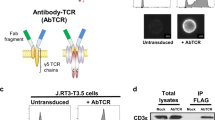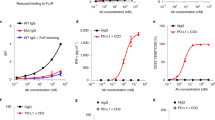Abstract
T cell triggering can be achieved by monoclonal antibodies (mAbs) specific for the CD3/TcR complex. In the presence of appropriate costimulation and/or progression factors, such triggering permits the generation of effector cells for immunotherapy protocols involving the redirection of T cell lysis against tumor cells by mAbs bispecific for anti-CD3/anti-tumor cells (bs-mAbs). Focusing our analysis on the clinically relevant bs-mAb OC/TR, we found that bs-mAbs generated with the same anti tumor specificity, but two other anti-CD3 mAbs, TR66 and OKT3, have the same and a significantly lower lytic potential, respectively, compared with that of OC/TR. To evaluate the relevance of the anti-CD3 component, we examined several anti-CD3 mAbs with respect to binding parameters and the ability to trigger T lymphocytes. Competitive binding assays suggested that all anti-CD3 mAbs recognized the same or overlapping epitopes, although mAbs BMA030 and OC/TR bound with lower avidity than did αCD3 (the bivalent anti-CD3 mAb produced by the hybrid hybridoma OC/TR), TR66 and OKT3, as determined by measurement of the affinity constants. In all lymphocyte populations examined, which included resting peripheral blood mononuclear cells (PBMC), activated PBMC and T cell clones, OKT3, BMA033 and OC/TR failed to mobilize Ca2+ without cross-linking, whereas αCD3, in both murine and murine-human chimeric versions, TR66 and BMA030, did not require cross-linking. The ability to induce CD3 modulation was associated in part with the induction of Ca2+ fluxes. Despite the differences in the behavior of these mAbs in triggering the events that precede proliferation, all of them ultimately led to expression of the IL-2 receptor and to proliferation in T cells in the presence of accessory cells. Our data suggest that anti-CD3 mAbs that bind more rapidly (strong Ca2+ mobilizers) and more tightly under physiological conditions are good candidates for retargeting T cells in the bs-mAb clinical application.
Similar content being viewed by others
Author information
Authors and Affiliations
Additional information
Received: 2 January 1997 / Accepted: 6 February 1997
Rights and permissions
About this article
Cite this article
Jacobs, N., Mazzoni, A., Mezzanzanica, D. et al. Efficiency of T cell triggering by anti-CD3 monoclonal antibodies (mAb) with potential usefulness in bispecific mAb generation. Cancer Immunol Immunother 44, 257–264 (1997). https://doi.org/10.1007/s002620050381
Issue Date:
DOI: https://doi.org/10.1007/s002620050381




